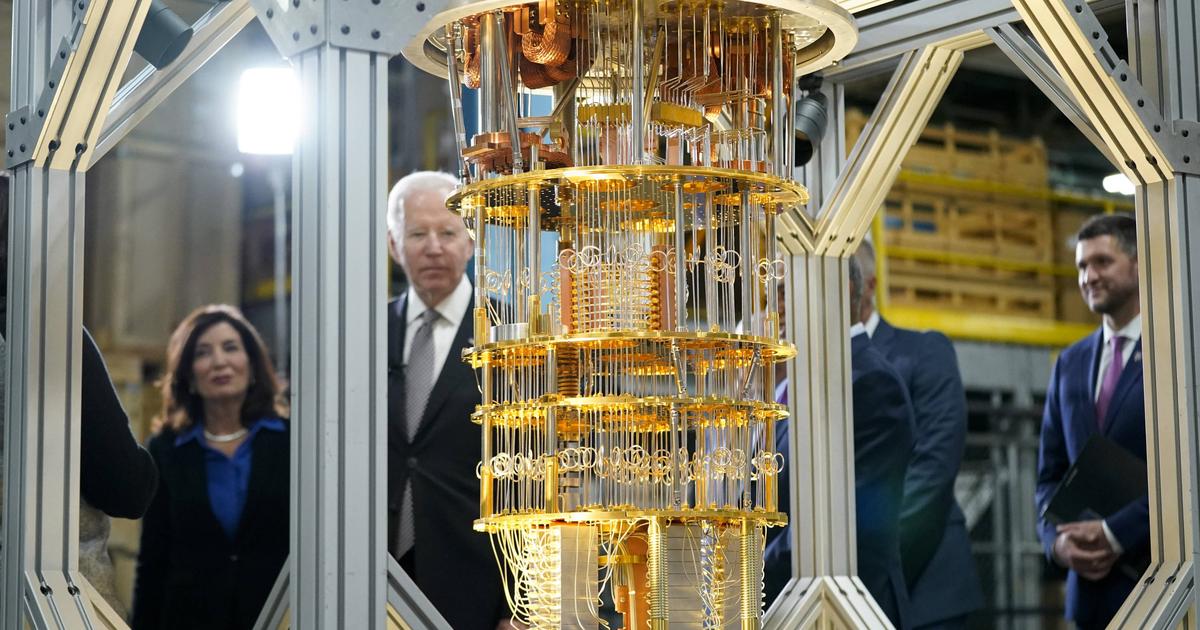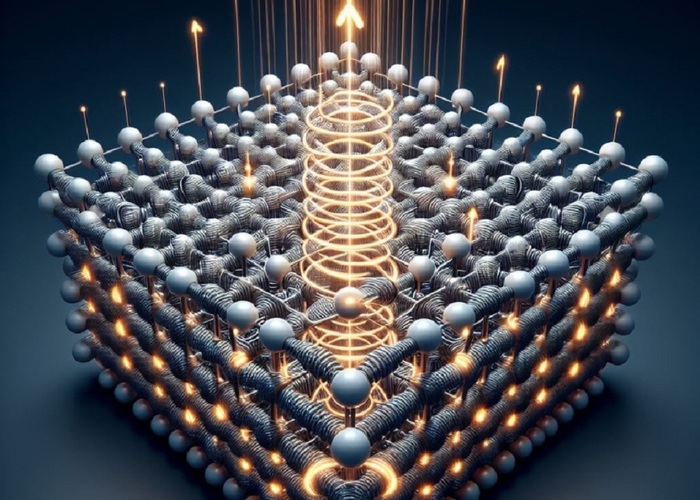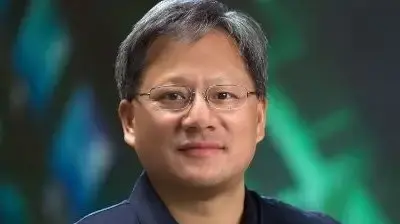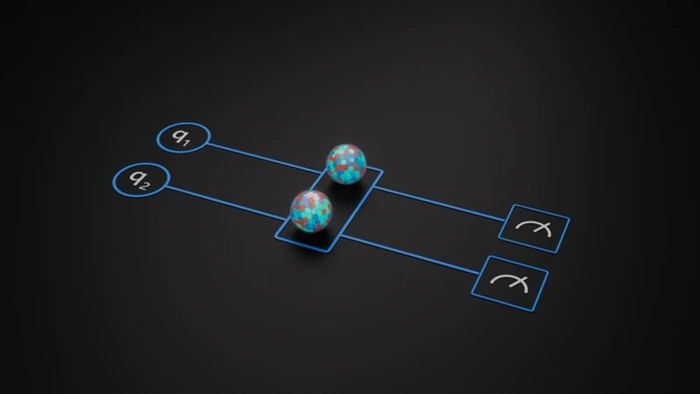column
A policeman stops the physicist Werner Heisenberg at the wheel of a car. "Do you know how fast they drove?" The official asks. "No," says Heisenberg, "but I know exactly where I am right now."A joke about quantum physics - Erwin Schrödinger, Georg Simon Ohm and a dead cat are also featured in the long version.
The world of quantum seems a strange kingdom. There are no certainties in this, as in the old world of Newtonian physics, but only probabilities. Today, quantum physicists can agree on how many phenomena from this world are to be calculated - but not what they actually mean.
Even before we really understood it, the almost 100-year-old quantum physics has possibly changed the world in a sustainable way. So sustainable that we can do it in a few decades - or years? - maybe barely recognizable.
A fatal mistake
This has to do with a research report, the draft of which apparently someone had carelessly placed on a reserved for such purposes servers of the US space agency Nasa. The server hung on the Internet, and Google's crawlers discovered the paper. As a result, quantum physicist Jonathan Dowling said that anyone interested in such research, who set up an alert on Google's Scholar research platform, would automatically receive a copy of the text.
How did the quantum supremacy paper leak? When NASA clears a paper for publication they put it on some obscure server. The Google search engine found there and then emailed it to everyone for their scholar alerts. So they were brought down by their own bots.
- Jonathan P. Dowling (@jpdowling) September 23, 2019"Your own bots caught them," Dowling tweeted.
The report comes from a team at Google that has been promising for years that quantum supremacy will soon be achieved. The dramatically sounding, thoroughly controversial term means to demonstrate that a quantum computer can solve a specific task much faster than a "classic" computer that only operates on bits of 0 or 1. Quantum computers work with so-called quantum bits or qubits, which can assume many different values.
Infinite copies of the universe?
Quantum mechanics is one of the craziest aspects of modern physics. There are many different readings of the same theoretical foundations. The physicist Sean Caroll, in his recently published, highly recommended book "Something Deeply Hidden," insists on one that seems particularly crazy: the "Many Worlds" hypothesis, according to which every tiny event observed is almost, but not produced quite an identical copy of the universe. A world with quantum mechanics - and in truth, everything is quantum mechanics, from the atomic nucleus to the shape of the universe itself - is in any case somehow bizarre and unimaginable. Nevertheless, based on the basic calculations, you can already build working computers.
Price query time:
04.10.2019, 17:32
No guarantee
DISPLAY
Sean Carroll
Something Deeply Hidden: Quantum Worlds and the Emergence of Spacetime
Publishing company:
Oneworld Publications
Pages:
368
Price:
EUR 16.81
Buy from Amazon Buy from Thalia
Product information is purely editorial and independent. The so-called affiliate links above, we usually receive a commission from the dealer when buying. More information here.
It was apparently not planned to publish the research paper just times, neither Google nor Nasa have commented on the incident. Many other researchers working on the same topic, however, consider it authentic: "According to experts, the leaked draft of Google's article is probably the first experimental evidence of the long-held theoretical assumption that quantum computers can beat even the most powerful modern supercomputers in certain tasks ", according to the professional journal" IEEE Spectrum "of the international professional association of engineers in electrical engineering and information technology. The magazine does not belong to the tabloids.
3 minutes instead of 10,000 years
According to the leaked report, a 53-bit QB quantum computer constructed by Google - the 54th has apparently broken - has solved a very difficult task designed specifically for this experiment in about three minutes and twenty seconds. According to the article, the world's fastest supercomputer would have taken 10,000 years to make the same calculation.
In fact, Hartmut Neven, the German-born head of the so-called Google Quantum Artificial Intelligence Lab, had already announced in the summer that the "quantum superiority" would be within reach in 2019.
Growth, as it hardly occurs in nature
Quantum computers are currently improving at a breathtaking pace - according to Neven, growth is double-exponential. That's why Google already speaks of "Neven's Law" based on Moore's Law. Double exponential means that the exponent of exponential growth also has an exponent once again. Such explosive growth is almost never seen in nature. For Neven, this phenomenon is reflected, among other things, in the fact that his team has to order ever greater computing capacity in Google's data centers or supercomputers to simulate what the quantum computer is doing.
This kind of research costs a lot of money - and at the moment it is flowing in abundantly, especially from private sources.
Adé, encryption?
Whether Nevens' law really stands up to reality and how fast quantum computers will actually be able to solve other problems that are not specifically tailored to their very specific characteristics is as unclear as controversial at the moment. After the spectacular leak, but seems to condense among professionals, the assumption that Google has reached the first milestone.
It may still take some time before it can be put to practical use: for example, John Preskill, the inventor of the term quantum supremacy , estimates that the first general-purpose quantum computers will not be around for 30 years.
All this is relevant, however, for two reasons in particular: With quantum computers one can, theoretically, crack excellent previous encryption mechanisms. Eventually, all of the encrypted information currently being hoarded by NSA and Five-Eyes intelligence services will become completely readable. When that happens, it will shake the globe.
Hello, artificial intelligence?
Even more surprising, however, could be the effects elsewhere: quantum computers, even the first prototypes now available, are particularly well suited for so-called optimization problems. Exactly the kind of problem that can be solved with machine learning. In this area too, progress is currently exponential. If these two developments come together in a fruitful way, computer systems will suddenly be able to provide services that were previously thought impossible. Machines that learn in seconds would be possible.
"We think long term," said Alán Aspuru-Guzik, a non-Google quantum investigator from the University of Toronto, Nature magazine. "But there might be some surprises tomorrow."
Hartmut Neven once said, with double-exponential growth, it's like this: "It looks like nothing's going to happen, and then - ups - you're in another world."









